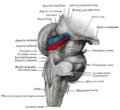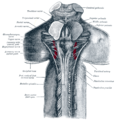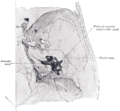- Vestibulocochlear nerve
-
Nerve: Vestibulocochlear nerve 
The course and connections of the facial nerve in the temporal bone 
Inferior view of the human brain, with the cranial nerves labelled. Gray's subject #203 To cochlear nerve, vestibular nerve MeSH Vestibulocochlear+Nerve Cranial Nerves CN I – Olfactory CN II – Optic CN III – Oculomotor CN IV – Trochlear CN V – Trigeminal CN VI – Abducens CN VII – Facial CN VIII – Vestibulocochlear CN IX – Glossopharyngeal CN X – Vagus CN XI – Spinal Accessory CN XII – Hypoglossal The vestibulocochlear nerve (also known as the auditory or acoustic nerve) is the eighth of twelve cranial nerves, and is responsible for transmitting sound and equilibrium (balance) information from the inner ear to the brain. The acoustic nerve is derived from the embryonic otic placode.
Contents
Structure and function
This is the nerve along which the sensory cells (the hair cells) of the inner ear transmit information to the brain. It consists of the cochlear nerve, carrying information about hearing, and the vestibular nerve, carrying information about balance. It emerges from the pons and exits the inner skull via the internal acoustic meatus (or internal auditory meatus) in the temporal bone.
Innervations
The vestibulocochlear nerve consists mostly of bipolar neurons and splits into two large divisions: the cochlear nerve and the vestibular nerve.
The cochlear nerve travels away from the cochlea of the inner ear where it starts as the spiral ganglia. Processes from the organ of Corti conduct afferent transmission to the spiral ganglia. It is the inner hair cells of the organ of Corti that are responsible for activation of afferent receptors in response to pressure waves reaching the basilar membrane through the transduction of sound. The exact mechanism by which sound is transmitted by the neurons of the cochlear nerve is uncertain; the two competing theories are place theory and temporal theory.
The vestibular nerve travels from the vestibular system of the inner ear. The vestibular ganglion houses the cell bodies of the bipolar neurons and extends processes to five sensory organs. Three of these are the cristae located in the ampullae of the semicircular canals. Hair cells of the cristae activate afferent receptors in response to rotational acceleration. The other two sensory organs supplied by the vestibular neurons are the maculae of the saccule and utricle. Hair cells of the maculae activate afferent receptors in response to linear acceleration.
Symptoms of damage
Damage to the vestibulocochlear nerve may cause the following symptoms:
- hearing loss
- vertigo
- false sense of motion
- loss of equilibrium (in dark places)
- nystagmus
- motion sickness
- gaze-evoked tinnitus.[1]
Name
Some older texts call the nerve the acoustic or auditory nerve [1], but these terms have fallen out of widespread use because they fail to recognize the nerve's role in the vestibular system. Vestibulocochlear nerve is therefore preferred by most.
See also
References
- ^ Coad, ML; Lockwood, A; Salvi, R; Burkard, R (2001). "Characteristics of patients with gaze-evoked tinnitus". Otology & neurotology : official publication of the American Otological Society, American Neurotology Society [and] European Academy of Otology and Neurotology 22 (5): 650–4. PMID 11568674.
Additional images
External links
- MedEd at Loyola GrossAnatomy/h_n/cn/cn1/cn8.htm
- cranialnerves at The Anatomy Lesson by Wesley Norman (Georgetown University) (VIII)
Nerves of head and neck: the cranial nerves and nuclei (TA A14.2.01, GA 9.855) olfactory (AON->I) optic (LGN->II) oculomotor
(ON, EWN->III)trochlear (TN->IV) no significant branchestrigeminal
(PSN, TSN, MN, TMN->V)abducens (AN->VI) no significant branchesfacial (FMN, SN, SSN->VII) near origininside
facial canalvestibulocochlear
(VN, CN->VIII)glossopharyngeal
(NA, ISN, SN->IX)before jugular fossaafter jugular fossavagus
(NA, DNVN, SN->X)before jugular fossaafter jugular fossaaccessory (NA, SAN->XI) hypoglossal (HN->XII) Auditory and vestibular pathways Auditory inner ear: Hair cells → Spiral ganglion → Cochlear nerve VIII →
pons: Cochlear nuclei (Anterior, Dorsal) → Trapezoid body → Superior olivary nuclei →
midbrain: Lateral lemniscus → Inferior colliculi →
thalamus: Medial geniculate nuclei →
cerebrum: Acoustic radiation → Primary auditory cortexVestibular inner ear: Vestibular nerve VIII →
pons: Vestibular nuclei (Medial vestibular nucleus, Lateral vestibular nucleus)
cerebellum: Flocculonodular lobe
spinal cord: Vestibulospinal tract (Medial vestibulospinal tract, Lateral vestibulospinal tract)
thalamus: Ventral posterolateral nucleus
Vestibulo-oculomotor fibersM: EAR
anat(e/p)/phys/devp
noco/cong, epon
proc, drug(S2)
Categories:- Cranial nerves
- Neuroscience stubs
Wikimedia Foundation. 2010.






